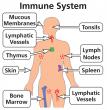Immune System
Audio
A complex network of specialized cells, tissues, and organs that recognize and defend the body from foreign substances, primarily disease-causing microorganisms such as bacteria, viruses, parasites, and fungi. Organs and tissues of the immune system include the bone marrow, spleen, thymus, tonsils, mucous membranes, and skin. Granulocytes, macrophages, and T lymphocytes are examples of specialized cells. The lymphatic vessels of the immune system carry immune cells, which converge in lymph nodes found throughout the body. A swollen lymph node often indicates an active immune response to a foreign substance. HIV gradually destroys the immune system.

